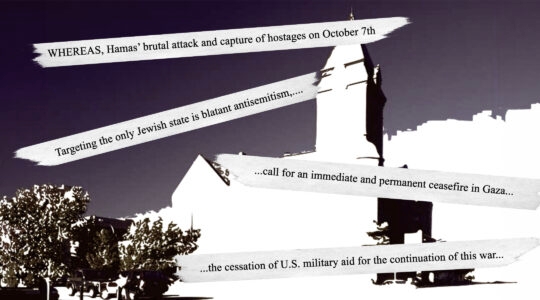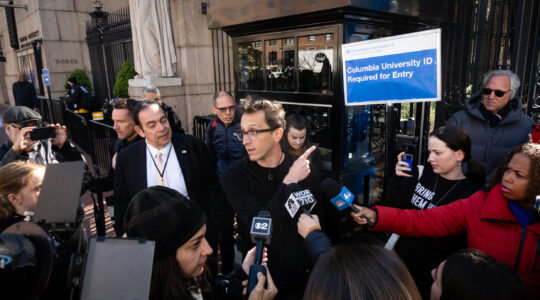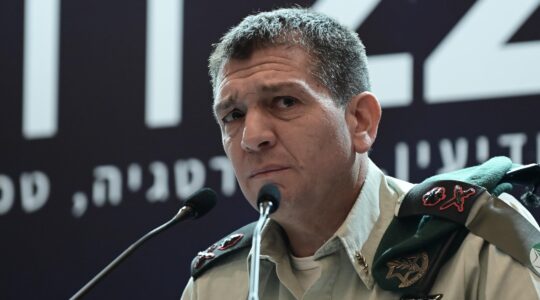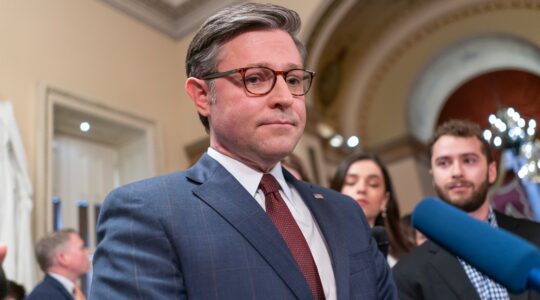WASHINGTON (JTA) — The campaign to curb Iran’s nuclear program just acquired a new deadline: the end of the 111th Congress.
The Obama administration has made a priority of ratifying the START nuclear arms reduction treaty with Russia before the Senate’s lame-duck session finishes at year’s end. A number of Republicans, citing what they say are weaknesses in the treaty, are balking.
The treaty, which was approved in September by the Senate’s Foreign Relations Committee, needs 67 senators for ratification.
President Obama’s overarching consideration in negotiating the treaty has been to keep two of his election promises: to reduce nuclear arms and to “reset” what had been a troubled relationship with Russia.
Another key component of the White House rationale in advancing START is further isolating Iran as a means of getting the Islamic Republic to end its suspected nuclear weapons program.
Vice President Joe Biden hosted a chat last Friday with journalists who reach constituencies that the White House is eager to win over. At the session, to which JTA was invited, top national security officials said that ratifying START was vital in keeping Russia on board on Iran.
“Once we finished in Geneva, signed the treaty in April, within a very short time we were working with the Russians on intensive sanctions against Iran in the U.N. Security Council,” said Rose Gottemoeller, the assistant secretary of state for the Bureau of Arms Control, Verification and Compliance, who led negotiations with Russia.
Mike McFaul, the special assistant to the president and senior director for Russia, said that Russia not only signed on to the sanctions — the toughest yet passed by the U.N. Security Council — but also suspended the sale of the S-300 anti-missile system to Iran.
“That especially hurts Russia’s economic and geopolitical interests,” he said of the sanctions and the suspension of the S-300 sale.
“Let’s just be blunt about it because [Russian President Dmitry] Medvedev has been blunt about it,” McFaul said. “He said unlike the START treaty, which he mentioned while we were in Prague was a win-win for the United States and Russia, this sanctions resolutions is asymmetric,” but that the relationship with the United States in the long run is going to be more valuable to Russia than that relationship with Iran.
Making compromises in the Middle East has been especially hard for the Russians, said Michael Adler, a scholar at the Woodrow Wilson Center who covered Iran for the French news agency AFP.
“The Russians have been recalcitrant on Iran for several reasons,” said Adler, speaking from Geneva, where he was attending nuclear talks between Iran and the major powers. “They don’t want to give the United States more power than it has on Middle East. If things go south with Russia, one of the ways for Russia to express its discontent is on Iran.”
The journalists asked to attend the session with Biden suggested just how focused the White House is on sending its message. There were reporters from newspapers in Illinois, Maine, Ohio and Florida — each with senators who are wavering on whether to ratify.
The White House and top Democratic senators have reached out to Jewish groups to support ratification. In a letter leaked to Politico, Sens. Charles Schumer (D-N.Y.) and Carl Levin (D-Mich.) — both Jewish and invested with credibility on Israel and defense issues — appealed to the American Israel Public Affairs Committee to openly support START.
“As a leading voice in favor of crippling sanctions on the Iranian regime, AIPAC cannot afford to stand on the sidelines as the Senate debates the New START treaty,” said the letter addressed to AIPAC Executive Director Howard Kohr.
The blunt appeal outraged some conservatives, who argued that it was untoward to pressure the Jewish community on a matter not directly related to Israel.
“Your letter — an effort to pressure an organization to lobby on a matter far outside its expertise and area of concern — is a disgrace,” the Emergency Committee on Israel wrote in a letter to Schumer and Levin. “We’ve rarely seen Senators stoop to this kind of public bullying.”
In fact, pro-Israel leaders said, such give-and-take is par for the course in Washington, and characterized the Bush administration effort in 2002 and 2003 to garner Jewish support for the Iraq War.
“Every administration from time to time with foreign policy has an interest” it wants the Jewish community to support, said Abraham Foxman, the national director of the Anti-Defamation League. “It happens from time to time. In this case they called, we said we’d take a look. We took a look, we agreed.”
While Israel has been silent on START because it does not directly concern the country, Israeli leaders in recent months have expressed relief at the suspension of the S-300 deal. They feared that delivery would substantially inhibit the prospects of any strike aimed at disabling an Iranian nuclear weapons program.
Medvedev’s announcement helped push back Israeli predictions of an imminent Iranian nuclear capability.
While AIPAC remained silent, Patrick Clawson, an Iran analyst at the Washington Institute for Near East Policy who is close to the organization, said failure to ratify START posed dangers.
“Lack of ratification of START may well lead to Russian retaliation on a variety of issues,” Clawson told JTA.
Ultimately, much of the community was on board for START: In addition to the ADL, the American Jewish Committee, the Jewish Council for Public Affairs, the Reform movement’s Religious Action Center, J Street, the American Council for World Jewry and the National Jewish Democratic Council endorsed ratification, and B’nai B’rith International said it could prove useful in isolating Iran.
The sole unequivocal voice in opposition was the Jewish Institute of National Security Affairs.
“We seriously question whether Russia is serious about stopping Iran, with or without New START,” JINSA said in an open letter to the American Jewish community. “There is no reason why the United States should be required to sacrifice its own defense capabilities to inspire Russia to a greater degree of diplomatic fortitude. If Russia is indeed concerned with a nuclear-armed Iran to its immediate south, it should need no extra incentive to take the action necessary to stop it.”
In an interview, JINSA Executive Director Tom Neumann said that the group and its allies — led by Sen. Jon Kyl (R-Ariz.) — are not opposed to the treaty per se, but want the time to consider its provisions, particularly related to modernizing the U.S. stockpile that would remain after its provisions were instituted.
The treaty would cut the U.S. stockpile by about a third, from about 2,200 to slightly more than 1,500.





